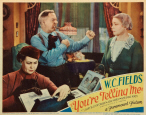|
  Sam Bisbee is the worry-ridden head of a family
that lives on the wrong side of the tracks. In an attempt to support
his family, he spends his time on several inventions, such as a
keyhole finder for inebriated home-comers. His lovely daughter adds to
the complications of life by falling in love with the son of the town's
leading snob. Sam Bisbee is the worry-ridden head of a family
that lives on the wrong side of the tracks. In an attempt to support
his family, he spends his time on several inventions, such as a
keyhole finder for inebriated home-comers. His lovely daughter adds to
the complications of life by falling in love with the son of the town's
leading snob.
Just as matters reach their lowest pitch, Sam
gets a letter from a rubber company asking for a demonstration of his latest
invention, a puncture-proof tire. He hilariously drives his car to the
company's office, and parks it in a non-parking zone. Later he proudly
shoots bullets at the tires. but his car has been replaced by a police
car, an exact replica. The tires go flat. In despair he catches
a train for home, and decides to commit suicide.
He tries to take his iodine in a collapsible
spoon of his own invention. When the spoon collapses, he decides to
face life after all. Then he sees a beautiful princess with a bottle
of iodine. Rushing into her compartment, he lectures her on the evils
of suicide and flings away the iodine, which she wanted to put on her sore
finger.
In the end, Sam, with the help of the Princess,
makes the social grade, opens a golf course, and receives a fortune for his
tire.
The Literary Digest (Argus)
"Adding a curiously convincing quality of pathos to his customary comic
brilliance,
"W.C. Fields offers one of his finest performances in the new screen
play called, for no particular reason, You're Telling Me. Since the
film permits Mr. Fields to play a disreputable inventor of mad devices and gives
him an opportunity to appear in almost every scene, it can be very definitely
set down as one of the most hilarious and satisfying of the recent
motion-pictures.
_NRFPT_02_small.jpg) _NRFPT_01_small.jpg) It is a pleasant enough little fable, of the popular type, celebrating the
success saga of the town reprobate, who makes good. With Mr. Fields
permitted to run free and wild throughout its plot manipulations, though, it
somehow takes on the qualities of heart-warming delight. Probably only Mr.
Fields, of all the comedians, including Chaplin, could make that scene of
attempted suicide hilarious, but, in some magic way, he does perform the
miracle. It is a pleasant enough little fable, of the popular type, celebrating the
success saga of the town reprobate, who makes good. With Mr. Fields
permitted to run free and wild throughout its plot manipulations, though, it
somehow takes on the qualities of heart-warming delight. Probably only Mr.
Fields, of all the comedians, including Chaplin, could make that scene of
attempted suicide hilarious, but, in some magic way, he does perform the
miracle.
Everything he does in You're Telling Me is funny. He is as
hilarious when walking silently down the street, slightly under the influence of
alcoholic liquor and swaying a little in the breeze, as he is in the midst of
that celebrated golf game of his, which is one of the comedy classics of our
time. In addition to being enormously funny, though, he is the creator of
a real character. This fumbling but robust, shrewd but blundering fellow
has a rich, hearty, racy quality of Dickensian magnitude. The new picture
offers a full-length portrait of his talents and, on that score, alone, it would
be worth attention. The comedy creations of the story merely go to provide
an extra dividend for the film followers. The work virtually is a monolog
for Mr. Fields, but there are helpful performances in the supporting roles."
Newsweek
"W.C. Fields is back on the job of splitting sides with his lugubrious
nonsense in his latest movie, You're Telling Me. The minor
characters are all well cast and amusing, but the whole looney [sic]
business is just an excuse to prove that
W.C. Fields is one of the craziest
comedians on earth."
|
